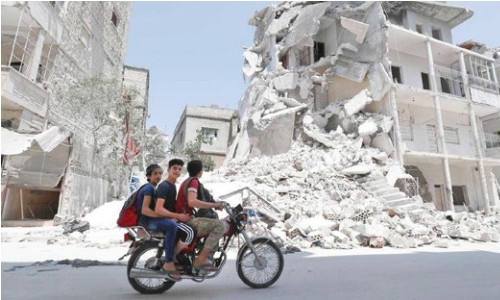Finally, peace comes to Syria’s Idlib region
No air strikes were reported in Syria’s rebel-held north-western Idlib region yesterday after the government announced a ceasefire in its three-month assault on the rebel-held region. The ceasefire was declared after the UN announced an investigation on Thursday into repeated strikes on civilian targets in an air campaign by the Syrian regime and its ally Russia. Syrian state media said the ceasefire would start on Thursday night if militants fulfilled a Russian-Turkish deal which had tried last year to create a demilitarised buffer zone.
The Turkey-backed opposition, which is taking part in peace talks hosted by Kazakhstan, agreed to the ceasefire and said it must “guarantee the safety of civilians”. It reserved the right to respond to “violations by Assad’s regime and its militias”. The Syrian Observatory for Human Rights, a Britain-based war monitor, said both sides exchanged fire and shelling on Friday but there were no raids by Syrian and Russian warplanes. Syrian state news agency Sana said militants fired missiles that hit a village in government territory, killing one person and injuring three other civilians.
Although Turkey-backed rebel factions also operate in Idlib province, the dominant force there is the Hayat Tahrir Al Sham coalition led by Al Qaeda’s former affiliate in Syria. In a statement on Friday, it said the truce declaration from Damascus proved the failure of “the criminal regime’s military operation against the liberated north”. HTS did not reject the ceasefire but warned that any attack from the other side would cancel it, vowing to retaliate. More than 400 civilians have been killed since the Syrian regime and Russia launched an offensive to retake the area in late April, and more than 440,000 have been displaced, the United Nations said last week.
The Observatory put the civilian death toll at nearly 800. The fighting has also inflicted a heavy toll on both rebel and government fighters. According to the Observatory, each side lost about 1,000 fighters with very little territory changing hands despite the intense fighting. United Nations Secretary General Antonio Guterres on Thursday announced an investigation into repeated attacks on UN-supported facilities such as schools and hospitals, after two-thirds of the Security Council pushed for an inquiry. The Syrian regime announced its ceasefire hours later.
The truce went into effect as Syria talks resumed in Kazakhstan between Turkey, Russia and Iran, Syrian President Bashar Al Assad’s other main ally. Syria’s representative at the talks in Astana said on Friday that the success of the ceasefire would depend on Turkey disarming rebels of heavy weapons and implementing a buffer zone, as agreed in the de-escalation deal reached with Moscow in the Russian resort town of Sochi last September. Bashar Jaafari, who is also Syria’s UN envoy, said the regime’s ceasefire announcement on Thursday was “a test of Turkey’s intentions”.
He also called on the guarantors of the talks to assume “their responsibilities by putting pressure on Turkey” to fulfil the conditions of the accord. “The ceasefire agreement is conditioned on Turkey upholding the Astana and Sochi agreements by disarming terrorists of heavy and medium weapons,” Mr Jaafari said. He accused the militant groups of shelling areas under regime control in northwest Syria “from areas Turkey controls in Idlib.”
“Even though we are patient, this time our patience will be limited. We will not be waiting endlessly for Turkey to fulfil its commitments,” he said. Under its deal with Russia, Turkey has forces stationed at a dozen military positions in the Idlib region. The accord, reached amid mounting international concern over the fate of more than 3 million civilians living in the rebel-held area, required all forces including those under HTS to withdraw fighters and heavy weaponry from a 20-kilometre buffer zone, but this was never fully implemented.
The Idlib region is the last major rebel-held region after eight years of brutal conflict triggered by an uprising against Mr Al Assad in 2011. With help from Russia and Iran, he now controls around 60 per cent of the country. Large areas of the north-east are controlled by Syrian Kurdish militias supported by the United States.
Related Posts

